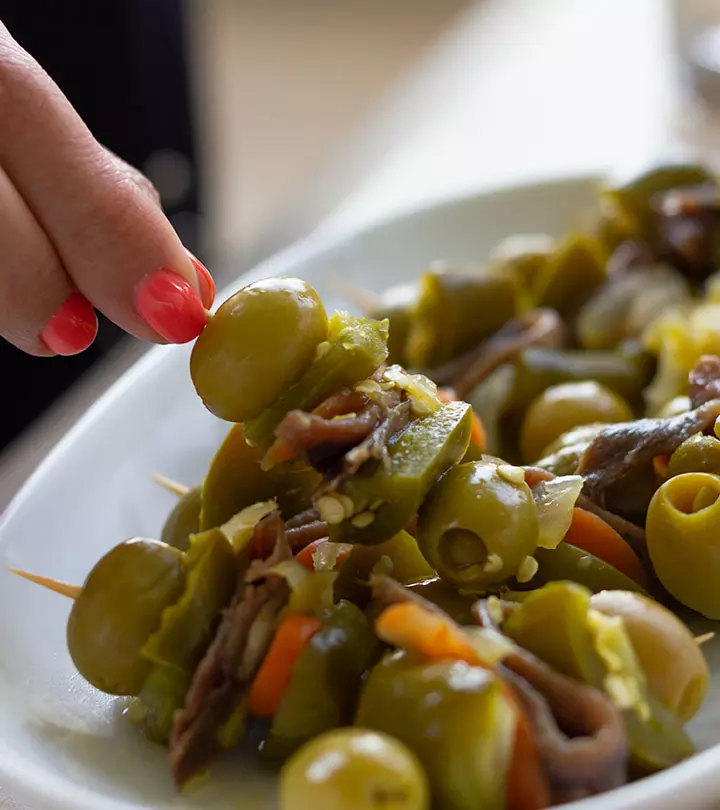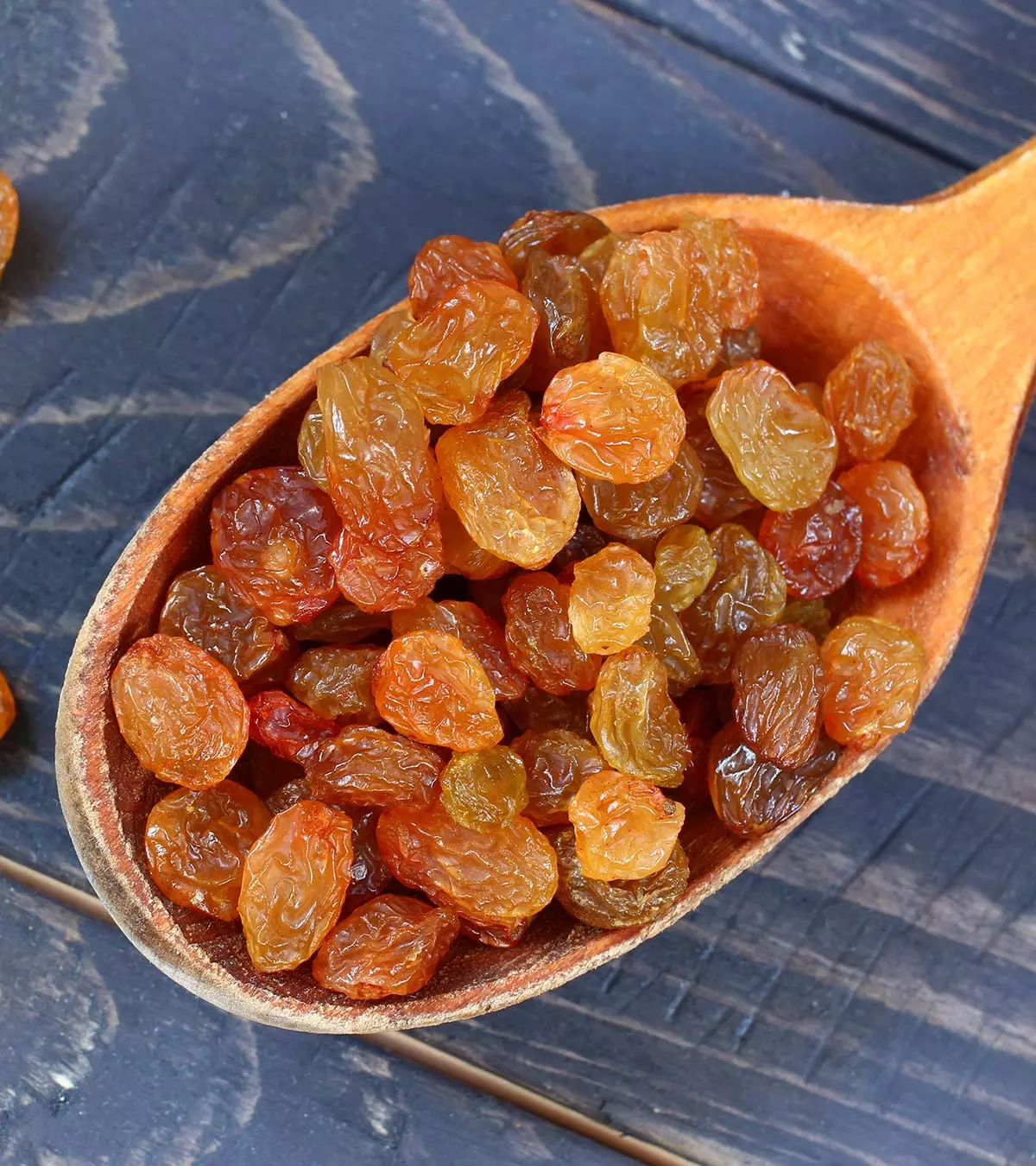
Image: Shutterstock
Raisins are dried grapes rich in natural sugar, micronutrients, and bioactive compounds. This sweet-tasting nutrient-rich food is easy to digest and a source of quick energy. Hence, consuming raisins during pregnancy seems a good choice to satiate sweet cravings and get instant energy. Besides, they can help avoid sugar-laden items like puddings, cakes, soft drinks, and frozen desserts that cause unwanted weight gain and other health issues over time. But though raisins are beneficial overall, are they a safe food choice for pregnant women? Keep reading to learn about the food safety and use of raisins for expecting mothers.

Key Pointers
- Raisins are a healthy dietary option for expectant mothers when consumed in moderation and can help them avoid sugary foods that might harm their health.
- Raisins act as a rapid energy source, help maintain oral health, and reduce the chance of developing heart disease and cancer.
- Consuming raisins in excess can lead to raising blood sugar levels, inducing gestational diabetes, and causing newborn obesity.
- Raisins contain high quantities of carbs, fiber, vitamins C and A, minerals like iron and calcium, and electrolytes like potassium and sodium.
Can You Eat Raisins During Pregnancy?
Yes. Raisins are rich in nutrients such as potassium, calcium and phosphorus among others that support fetal growth
. These are healthy eating alternatives to desserts and offer quick energy along with several health benefits for the mother and the baby (1). However, you must eat them in moderate amounts to stay healthy and avoid any complications. And should be avoided if you have been diagnosed with gestational diabetes.
Hannah Whittaker, a pediatric and pregnancy dietitian from Liverpool, England, says, “Raisins are high-fiber foods rich in antioxidants, and can be a quick on-the-go snack. They help fight infection and are a source of iron, vitamin C, and calcium.”
 Quick fact
Quick factHow Many Raisins Can You Eat Daily During Pregnancy?
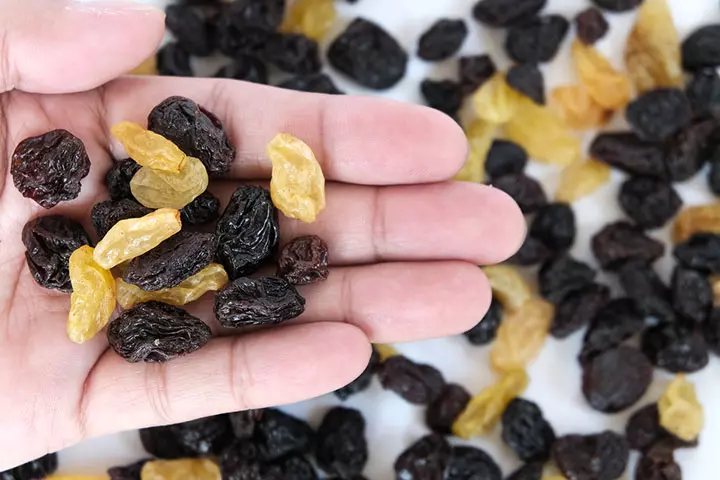
You may have a handful of raisins in a day; also, ¼ cup of raisins can provide about 1 mg of iron (2). They are a great snack packed with rich nutrition.
What Are The Benefits Of Eating Raisins During Pregnancy?
Here are the benefits of raisins for both you and your baby:
1. Prevents anemia
Iron deficiency anemiai is a common complaint during pregnancy. According to the Centers for Disease Control and Prevention, the prevalence of anemia among pregnant women participating in the Special Supplemental Nutrition Program for Women, Infants, and Children (WIC) has witnessed a 13% rise, going from 10.1% in 2008 to 11.4% in 2018. Raisins contain good levels of iron and vitamin C that help to lower the risk of anemia (3).
2. Treats constipation
Many women experience constipation and other digestive issues during pregnancy (4). Raisins can provide the solution to this often-irritating problem as they contain fiber that eases the bowel movements (5). If you can eat grapes during pregnancy, you can include raisins to your pregnancy diet.
“Raisins are a great source of fiber and may help reduce constipation. However, I would advise my clients not to consume fiber-rich foods excessively and to drink adequate fluids,” Whittaker adds.
3. Dental health
Swollen gums or gingivitisiInflammation or swelling in the gums (gingiva), most commonly caused due to a bacterial infection is another common condition during pregnancy (6). Raisins are rich in oleanolic acidiA triterpenoid compound naturally found in food and medicinal plants and calcium that protect your teeth and gums (7).
4. Prevents cancer and heart diseases
Raisins contain potent antioxidants that help combat oxidative stress and lower the risk of cancers, heart stroke, and conditions (8).
5. Supplies energy
Raisins are a good source of glucose and fruit sugars. A handful of raisins can give you an instant boost of energy (9).
6. Fetal bone and vision
Consumption of raisins helps in baby development too. The vitamin A content helps in eyesight development (10), and calcium makes the bones stronger.
Next, let’s see the amount of nutrition a cup or handful of raisins provides.
Nutritional Value Of Raisins
According to the USDA, 100 g of dark, seedless raisins contain (11):
| Nutrient | Amount |
|---|---|
| Water | 15.46g |
| Calories | 299kcal |
| Carbohydrates | 79.32g |
| Protein | 3.30g |
| Fiber | 4.5g |
| Fat | 0.25g |
| Sugars | 65.18g |
| Vitamins | |
| Vitamin C | 2.3mg |
| Thiamine (Vitamin B1) | 0.106mg |
| Riboflavin (Vitamin B2) | 0.125mg |
| Niacin | 0.766mg |
| Vitamin E (alpha-tocopherol) | 0.12mg |
| Pyridoxine (Vitamin B6) | 0.174mg |
| Folate | 5mcg |
| Vitamin K | 3.5mcg |
| Electrolytes | |
| Potassium | 744mg |
| Sodium | 26mg |
| Minerals | |
| Calcium | 62mg |
| Iron | 1.79mg |
| Magnesium | 36mg |
| Zinc | 0.36mg |
| Phosphorus | 98mg |
g=grams; mg=milligrams; mcg=micrograms; IU=international unit
Are There Any Side Effects Of Eating Raisins During Pregnancy?
Though raisins have a high nutritional value and offer health benefits, they can be harmful when taken in excess amounts. Raisins can:
- Increase your blood sugar levels, and therefore may contribute to being diagnosed with gestational diabetes.
- If you are diagnosed with gestational diabetes, continuing to eat raisins or any foods high in sugar (even natural sugars) can cause infant obesity.
- Increase the chances of you and your baby getting type 2 diabetes.
 Quick fact
Quick factHow To Eat Raisins During Pregnancy?
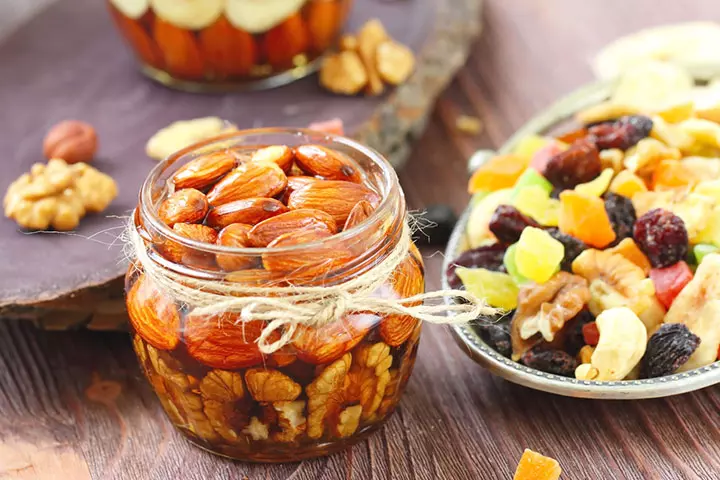
You can have a handful of raisins whenever you crave for something sweet. Try some interesting ways to consume them.
- Soak a handful of raisins in cold water for one hour. Drain the water and eat them along with hot milk before bedtime.
- Add raisins to boiling water, and steep for 10 to 15 minutes. You can consume the water in small quantities throughout the day.
- Make a trail mix of raisins, nuts and dried apricots to make a healthy snack.
- Take some amount of raisins and nuts of your choice, and add honey. Store it in a container, and you can have one tablespoon of this delicious treat every morning.
- Include raisins in your breakfast by adding them to your oatmeal, pancake batter, or yogurt bowl for a sweet twist.
Can You Eat Raisins During Early Pregnancy?
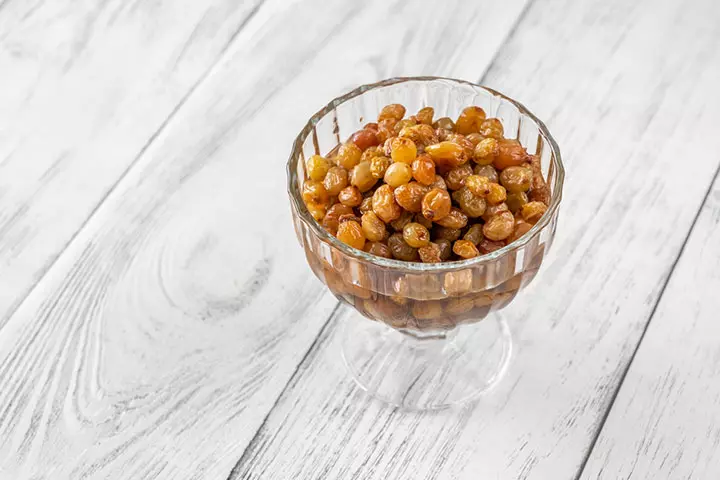
Yes, you can eat raisins during early pregnancy for a quick energy boost and to also cope with constipation. Soaked raisins will be more effective for constipation.
Can You Eat Black Raisins Soaked In Water?
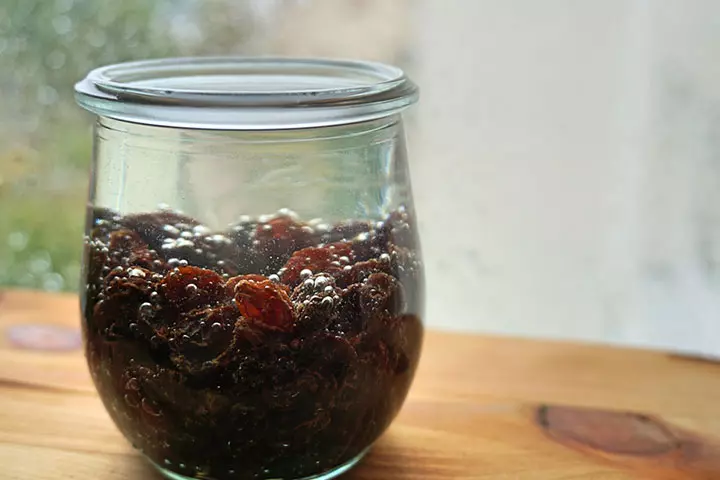
Yes, black raisins soaked in water are an excellent remedy for constipation. These soaked raisins also promote good liver health. Raisins being the natural sources of vitamins and minerals, offer significant benefits and promote gastrointestinal and cardiovascular health (12).
What Are The Benefits Of Black Raisins During Pregnancy?
Black raisins offer the same benefits as other types of raisins. They help in blood purification, improving hemoglobin levels and immunity, regulating blood pressure, combating bad cholesterol, improving bone health and the digestive system.
 Quick fact
Quick factCan You Eat Munakka (Raisins) With Milk During Pregnancy?
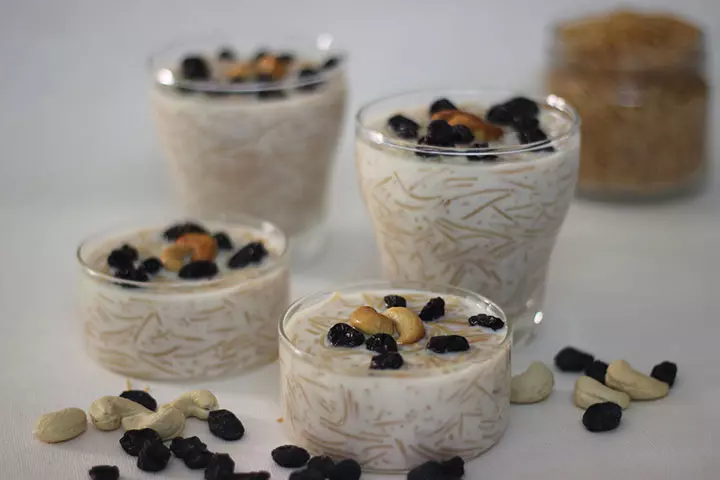
Yes, you can eat munakka (black raisins) with milk to ease constipation. Boil around ten munakkas in a glass of milk, and consume them before bedtime. Pair fiber-rich foods such as raisins with fluids to combat chronic constipation (13).
Frequently Asked Questions
1. Are there any alternatives to raisins that provide similar benefits during pregnancy?
Dried apricots and prunes are a good replacement for raisins. They contain fewer calories and sugars than raisins and more iron and fiber. They are, therefore, a good substitute for raisins. Make sure you consult your healthcare provider before consuming dry fruits in pregnancy (11) (16) (17).
2. Are there any potential allergic reactions to raisins during pregnancy?
Raisin allergy is quite rare but not impossible (18). If you have never had raisins earlier, try them in smaller quantities before consuming them in excessive quantities. If you notice any symptoms of allergies, report it to the doctors.
Infographic: How To Eat Raisins When Pregnant?
Rich in nutrient profile and bioactive compounds, raisins are dried grapes that can be relished in various ways. It is a natural sweetener, so a good choice to satisfy sweet cravings during pregnancy. Let’s look at the infographic below to learn some healthy ways to eat raisins when pregnant.
Some thing wrong with infographic shortcode. please verify shortcode syntax
Illustration: Health Benefits Of Raisins During Pregnancy
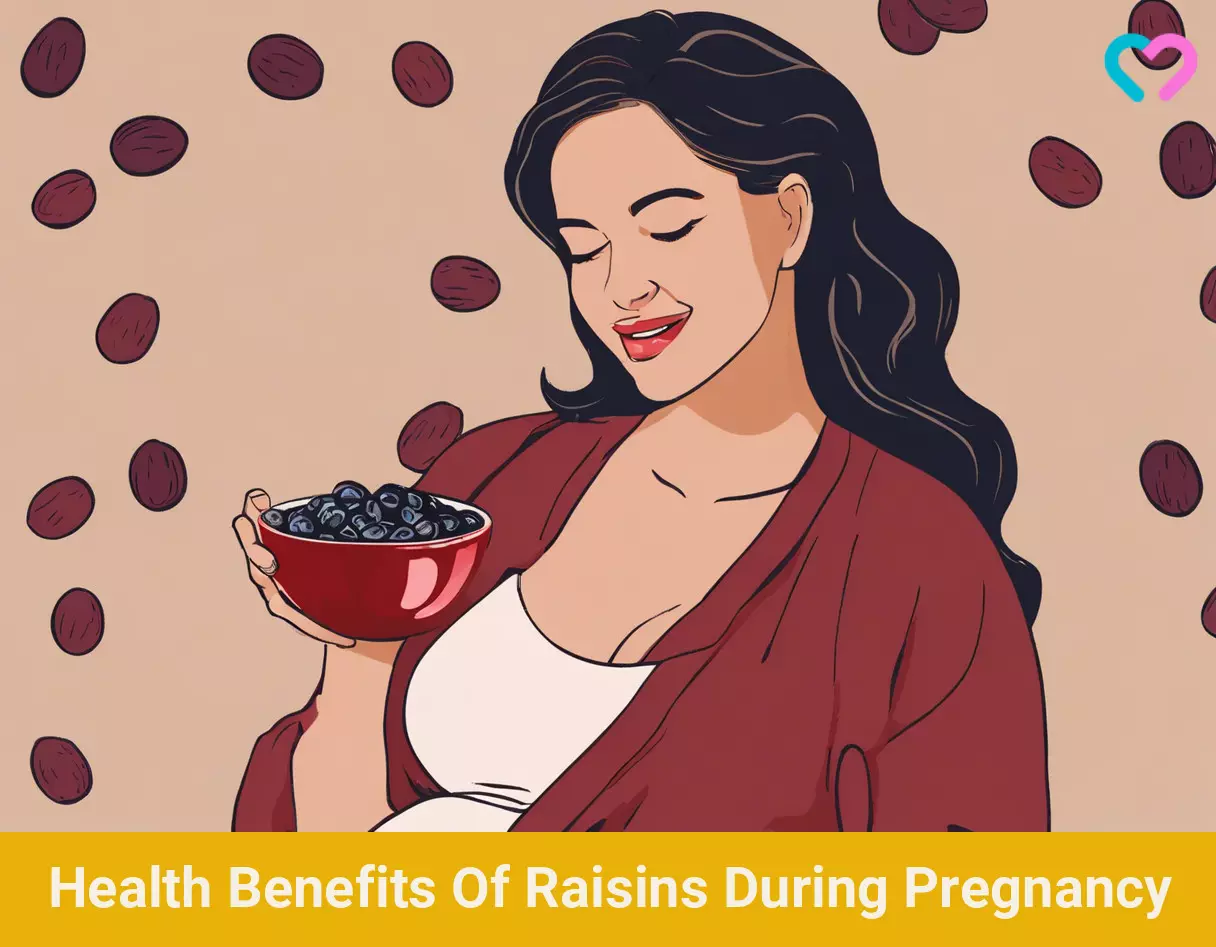
Image: Stable Diffusion/MomJunction Design Team
References
- Healthy Snacking During Pregnancy.
https://www.med.umich.edu/1libr/Nutrition/SnacksPregnency.pdf - Anemia and Pregnancy.
https://www.ucsfhealth.org/education/anemia-and-pregnancy - Anemia.
https://mihp.utah.gov/during-pregnancy/anemia - Catherine S Bradley et al., (2007); Constipation in pregnancy: prevalence, symptoms, and risk factors.
https://pubmed.ncbi.nlm.nih.gov/18055731/ - Constipation.
https://www.urmc.rochester.edu/encyclopedia/content.aspx?contenttypeid=85&contentid=p00363 - Richard Niederman; (2013); Pregnancy gingivitis and causal inference.
https://pubmed.ncbi.nlm.nih.gov/24357820/ - Christine D. Wu; (2009); Grape Products and Oral Health.
https://www.ncbi.nlm.nih.gov/pmc/articles/PMC2728698/ - MyPlate Lesson Plan.
https://www.maricopa.gov/DocumentCenter/View/33689/3-4-MyPlate-Curriculum-Notes - Alexandra Olmo-Cunillera et al., (2019); Is Eating Raisins Healthy?
https://www.ncbi.nlm.nih.gov/pmc/articles/PMC7019280/ - Making Healthy Food Choices the MyPlate Way
https://www.womenandinfants.org/services/pregnancy/pregnancy-planner - Raisins, dark, seedless.
https://fdc.nal.usda.gov/fdc-app.html#/food-details/168165/nutrients - Margaret J. Schuster et al.,(2017); A Comprehensive review of Raisins and Raisin components and their relationship to human health.
https://www.researchgate.net/publication/319062831_A_Comprehensive_review_of_Raisins_and_Raisin_components_and_their_relationship_to_human_health - Nutrition Tips for Relieving Constipation.
https://www.eatright.org/health/health-conditions/digestive-and-gastrointestinal/nutrition-tips-for-relieving-constipation - Is Eating Raisins Healthy?.
https://www.ncbi.nlm.nih.gov/pmc/articles/PMC7019280/ - Pesticide residues in dried table grapes from the Aegean region of Turkey.
https://www.researchgate.net/publication/26298555_Pesticide_residues_in_dried_table_grapes_from_the_Aegean_region_of_Turkey - Prunes dried.
https://fdc.nal.usda.gov/fdc-app.html#/food-details/1102639/nutrients - Apricots dried sulfured uncooked.
https://fdc.nal.usda.gov/fdc-app.html#/food-details/173941/nutrients - S Chibuluzo and T Pitt; (2014); Raisin allergy in an 8 year old patient.
https://www.ncbi.nlm.nih.gov/pmc/articles/PMC4304147/#:~:text=Raisin%20allergy%20is%20uncommon%20despite
Community Experiences
Join the conversation and become a part of our nurturing community! Share your stories, experiences, and insights to connect with fellow parents.
Read full bio of Jacky Bloemraad-de Boer
- Hannah Whittaker is an expert pregnancy and pediatric dietitian with nearly 20 years of experience, the last 7 years as a registered dietitian. She manages her private practice Bump2baby Nutrition in the UK, having done her graduation in community nutrition and dietetics from Liverpool John Moores University & University of Chester respectively.
 Hannah Whittaker is an expert pregnancy and pediatric dietitian with nearly 20 years of experience, the last 7 years as a registered dietitian. She manages her private practice Bump2baby Nutrition in the UK, having done her graduation in community nutrition and dietetics from Liverpool John Moores University & University of Chester respectively.
Hannah Whittaker is an expert pregnancy and pediatric dietitian with nearly 20 years of experience, the last 7 years as a registered dietitian. She manages her private practice Bump2baby Nutrition in the UK, having done her graduation in community nutrition and dietetics from Liverpool John Moores University & University of Chester respectively.
Read full bio of Swati Patwal
Read full bio of Rebecca Malachi
Read full bio of Aneesha Amonz










